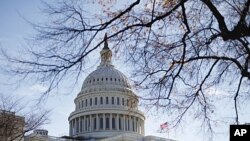Last-ditch hopes for a bipartisan deal to improve U.S. government finances are waning, days before a deadline for a special congressional committee to recommend ways to achieve $1.2 trillion in deficit reduction over 10 years. Although the so-called “supercommittee” technically has until Wednesday to act, a firm proposal is needed by late Monday so lawmakers and budget analysts can review the plan.
With hours remaining until Monday’s interim deadline, no one on the 12-member supercommittee says a deal is imminent. The Republican co-chairman, Congressman Jeb Hensarling of Texas, spoke on the U.S. television program Fox News Sunday.
"Nobody wants to give up hope. Reality is, to a certain extent, starting to overtake hope. It is a daunting challenge, no doubt about it," he said.
A Democratic supercommittee member, Representative Xavier Becerra of California, compared the situation to the final minutes of a sporting match.
"We are deep into the fourth quarter, but there is still time on the clock. I do not think any of us wants to let the time run out," he said.
Days ago, many lawmakers of both parties urged the supercommittee to bridge ideological gulfs and arrive at a compromise that cuts the deficit by more than the minimum $1.2 trillion specified in a budget deal signed into law earlier this year. Recent weeks have seen some Republicans soften their opposition to new tax revenue, while many Democrats, including President Barack Obama, have long said they would be willing to restructure costly programs that provide income and health care for retirees.
But the ratio of spending cuts to tax hikes, and the specific composition of both, present a seemingly insurmountable stumbling block.
Representative Hensarling says Democrats continue to oppose meaningful spending restraint.
"We all know, and even the president will admit, that the great drivers of our debt are Medicare, Medicaid and health care. Nothing else comes close. But unfortunately what we have not seen in these talks is any Democrat willing to put a proposal on the table that actually solves the problem," he said.
Democrats counter that it is Republican insistence on preserving tax cuts for the rich that is the major sticking point. Once again, Congressman Becerra, who also appeared on Fox.
"Every plan that Democrats have put forward has included cuts to entitlement programs. But it has got to be balanced," he said. "You cannot say you are going to take benefits away from Social Security and Medicare, and not ask our wealthiest Americans [to pay more taxes] - why should they escape participation when we are asking seniors to help cover the costs of deficits?"
Failure by the supercommittee would trigger automatic spending cuts to domestic programs and national defense. In addition, a wide range of tax cuts enacted since 2001 will expire unless extended by Congress.
Economist Mark Zandi of Moodys Analytics, a financial ratings firm, says he does not foresee an immediate market panic if the supercommittee fails.
"I do not think there will be much of a reaction. It is all relative to expectations, and investor expectations with regard to the [super]committee have been and still are very, very low," he said.
But Zandi adds that a long-term failure by the United States to confront its debt problem would harm the economy and shatter investor confidence. The U.S. federal deficit exceeds $1 trillion, contributing to a national debt of about $15 trillion.
Hopes Fade for US Deficit Reduction Deal




